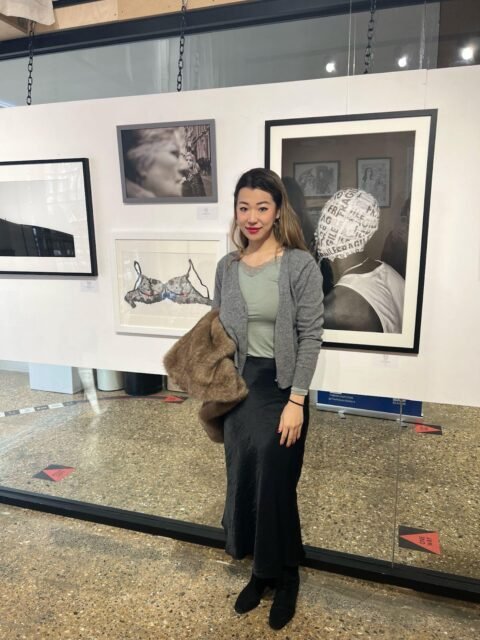Yukimasa Ida paints with a fervor that seems to challenge time itself, capturing the ephemeral essence of every encounter with his subjects.
Ida is a young follower of “Ichi-go Ichi-e,” (“one time, one meeting”) an ancient Japanese four-character concept with historical roots dating back to the 16th century, attributed to the tea master Sen no Rikyū. Over time, this idiom has evolved into a broader philosophy encompassing notions of time, life, and death—it is from this exploration of transience that Ida draws his inspiration.
During a journey to India in his early 20s, Ida encountered a similar philosophy among the locals. Of the countless people he met, the memory of one remains vivid: a young girl from a slum searching through a pile of garbage, finding discarded food and sharing a radiant smile with him before disappearing. That moment crystallized Ida’s understanding of “Ichi-go Ichi-e.” He realized that such encounters are unique and fleeting, and he vowed to imbue his art with the intensity of these moments.
“If God gives it to man impartially,” Ida said. “I thought, at least I would leave my strong emotion for that one moment, and that encounter.”
On the last day of September, the 33-year-old artist unveiled his first major museum exhibition, “Panta-Rhei—For as long as the world turns,” at the Kyoto City Kyocera Museum of Art. Curated by Jérôme Sans, the exhibition features Ida’s works from 2015 to 2023 and is presented non-chronologically.
This approach unveils Ida’s unique artistic vocabulary and prolific body of work, encompassing paintings, sculptures, portraits, abstractions, and figurations. “Yukimasa Ida is an artist who embodies absolute freedom by defying and thwarting any notion of style,” Sans noted.
“Panta-Rhei—For as long as the world turns” at the Kyoto City Kyocera Museum of Art. Photo: Keizo Kioku.
The exhibition’s title draws from the writing of the ancient Greek philosopher Heraclitus and translates to “everything flows,” which encapsulates Ida’s approach to capturing the present moment and his unwavering commitment to embody it through his art. For Ida, this show represents both the culmination of his career thus far and a fresh beginning.
“Art exists for the sake of people, but the existence of people is also changing day by day. Keep observing the beauty of the moment,” he reflected during an interview, “as long as the world turns, all things will continue to change. That is the only thing that will never change universally.”
“Panta-Rhei—For as long as the world turns” at the Kyoto City Kyocera Museum of Art. Photo: Keizo Kioku.
Painting remains at the heart of Ida’s artistic practice, and this is why the exhibition begins one of Ida’s paintings on the floor, creating an immersive experience where viewers feel as if they are walking through one of his artworks, “It is as if the viewer finds themselves in the metaverse as if they were walking through one of his paintings.” said Sans.
When viewed up close, the distorted figuration in Ida’s painting creates a sense of ambiguity that forces viewers to focus on the work’s assembly. Thick layers of oil paint take on a sculptural quality, and the irregular brushstrokes and exaggerated colors draw the viewer in closer. In each piece, Ida allows different layers, materials, memories, and spaces to intermingle, creating a synthesis of both futurism and nostalgia, weaving together memories of the past and the beauty of the present. In some sense, Ida paints as if he’s always grasping at passing visions.
Yukimasa Ida, Self-Portrait (2022), oil on canvas. Photo: © Ida Studio Inc. Courtesy of Mariane Ibrahim.
Ida’s creative process involves rapidly dragging oil across the canvas, an intentional technique he has refined through training over time. He also experiments with scribbling on canvas using scissors or his hands, striving to capture the fleeting moment. His art oscillates between figuration and abstraction, bridging the worlds of painting and sculpture, and reflecting his exploration of the nature of “things that keep changing” alongside his abiding belief that “things never change.”
The “End of Today” series, for example, offers an intimate glimpse into Ida’s “pictorial diaries.” Each of the 300 small paintings was created within a 24-hour timeframe, mirroring the ephemeral nature of social media feeds.
“Panta-Rhei—For as long as the world turns” at the Kyoto City Kyocera Museum of Art. Photo: Keizo Kioku.
Ida’s sculptures are also intimately linked to his paintings. In Study for the Pope (2019), he crafts a distorted and crushed bronze face, reminiscent of Francis Bacon’s reinterpretation of Velazquez’s Portrait of Pope Innocent X. His wooden sculptures feature raw and primal carvings.
While painting and sculpture might differ structurally, for Ida they share a similar path for artistic expression. “I feel that the sense of modeling clay and the moment of placing thick layers of paint in a painting are close to each other,” he noted.
“Panta-Rhei—For as long as the world turns” at the Kyoto City Kyocera Museum of Art. Photo: Keizo Kioku.
Having his first grand-scale institutional show at the Kyoto City Kyocera Museum of Art holds special significance for Ida. He recalls visiting the museum 17 years ago, during a solo journey across Japan, when he encountered the work of the French Fauvist Maurice de Vlaminck. “It left a strong impact on me,” the 33-year-old artist recalled, “and I decided then to become a painter on my way back to my accommodation.”
A smaller satellite show is also on at the Yonago City Museum of Art in Tottori Prefecture, and Ida said he sees both cities as reflecting his “origins,” connected “by a string of fate,” since Yonago is where he was born and raised, while Kyoto inspired his artistic practice and career.
Yukimasa Ida and Jérôme Sans in Japan in 2023. Photo: Koki Urano. Courtesy of Mariane Ibrahim.
Ida’s day revolves around creation. He leads a relatively simple life, spending most of his time in his studio. When asked how he selects his subjects, Ida said he chooses things that have deepened his view of the world, which aren’t always conventionally beautiful. “A dead frog on the roadside, or a telephone pole piercing the sky,” he gave as examples, “things that contain a unique beauty within time.”
And while his art might focus on finding beauty in the everyday, it has also garnered admiration from major celebrities across Asia, leading to notable collaborations. In 2021, he was featured in collaborative sale organized by Taiwanese singer Jay Chou and Sotheby’s, setting an artist record at the time. In 2023, Taiwanese actor Bolin Chen curated another sale featuring Ida’s work, again with Sotheby’s. And notably, South Korean rapper T.O.P is known for having Ida’s work in his collection, and is often spotted with the artist. Ida reached a new auction record again this March, when one of his oil paintings sold for 55 million Yen ($408,764) at SBI Art Auction.
Ida views his intersection with pop culture and recognition by famous personalities as both a pleasure and an honor, even though his art doesn’t fit the pop art genre. He remains unfazed by fame, staying true to his personal philosophy and deepening his artistic journey.
He is currently working on a project that examines space and Earth’s position within it, and a future exploration will take in the wider universe and everything it contains. But even such scientific and forward-looking subjects link back to Ida’s interest in the personal and the past. “I like to see how it connects with history,” he said.
Yukimasa Ida in his studio. Photo: © Koki Urano. Courtesy the studio and Mariane Ibrahim Gallery.
Yukimasa Ida in his studio. Photo: © Koki Urano. Courtesy the studio and Mariane Ibrahim Gallery.
Yukimasa Ida in his studio. Photo: © Koki Urano. Courtesy the studio and Mariane Ibrahim Gallery.
Yukimasa Ida’s studio. Photo: © Koki Urano. Courtesy the studio and Mariane Ibrahim Gallery.
More Trending Stories:
Art Dealers Christina and Emmanuel Di Donna on Their Special Holiday Rituals
Stefanie Heinze Paints Richly Ambiguous Worlds. Collectors Are Obsessed
Inspector Schachter Uncovers Allegations Regarding the Latest Art World Scandal—And It’s a Doozy
Archaeologists Call Foul on the Purported Discovery of a 27,000-Year-Old Pyramid
The Sprawling Legal Dispute Between Yves Bouvier and Dmitry Rybolovlev Is Finally Over
Follow Artnet News on Facebook:
Want to stay ahead of the art world? Subscribe to our newsletter to get the breaking news, eye-opening interviews, and incisive critical takes that drive the conversation forward.




